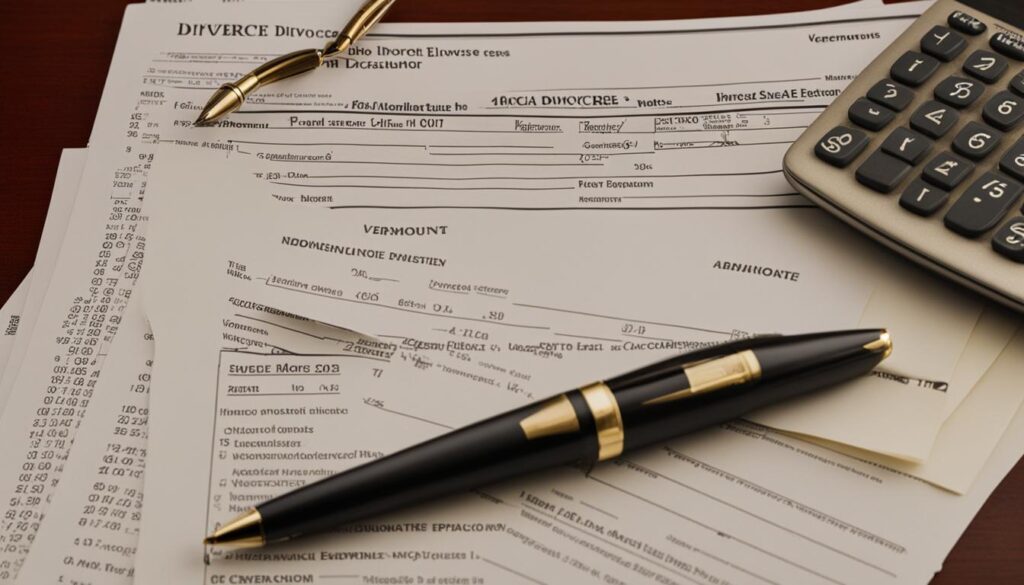Physical Address
304 North Cardinal St.
Dorchester Center, MA 02124
Physical Address
304 North Cardinal St.
Dorchester Center, MA 02124


Filing for divorce in Vermont can feel like journeying through a quiet, yet complex, woodland path. It’s a process that’s not only wrapped in legal intricacies but also steeped in personal significance. Vermont’s divorce laws carve out a unique route, with specific requirements and steps to follow.
From understanding residency qualifications to navigating the maze of legal documentation, each aspect is a critical piece of the puzzle. But traversing this path doesn’t have to be a solitary trek. This article is your guide through the serene yet intricate landscape of Vermont’s divorce procedures.
We’re here to simplify the legal terminology and address the emotional journey. Ready to take the first steps on this path in the Green Mountain State? Keep reading to learn about the vital steps for filing for divorce in Vermont, and begin your journey towards a new chapter with confidence and understanding.
For more on how to file for divorce, check out our article, How to File for Divorce: A Concise Guide for Couples.
Continue reading the article for a detailed understanding of the divorce process in Vermont and navigate through this challenging time smoothly.
Before filing for divorce in Vermont, you have to meet the state’s residency requirements.
Either you or your spouse must have lived in the state for at least six months. However, to obtain the final divorce decree, one of you must have been a resident of Vermont for a full year.
This means that even if you meet the initial six-month requirement, you may need to wait until the one-year mark to finalize your divorce.
Meeting the residency requirements is crucial as the court needs jurisdiction over your case to legally grant a divorce. You’ll need to show the necessary proof of residency, such as utility bills, lease agreements, or documentation from employers or schools, to support your claim.
| Residency Requirement | Duration |
|---|---|
| Minimum Residency Requirement | At least six months |
| Requirement for Final Divorce Decree | At least one year |

To file for divorce in Vermont, you need to understand the legal grounds on which you can base your divorce. Vermont allows both “fault” and “no-fault” grounds for divorce, giving individuals options depending on their specific circumstances.
A no-fault divorce in Vermont is based on a separation period of at least six months. During this time, it is unlikely that the spouses will reconcile. This option is available when both parties agree that their marriage is irretrievably broken and there is no hope for reconciliation.
On the other hand, fault-based grounds for divorce include specific reasons that demonstrate misconduct or wrongdoing by one of the spouses.
Some of the fault-based grounds recognized in Vermont include adultery, intolerable severity, willful desertion, refusal or inability to support a spouse, and serving a prison sentence for at least three years.
Filing for divorce on fault grounds can make the process more contentious and complex.
When determining the grounds for your divorce, gather evidence and consult with a legal professional who can guide you through the specific requirements of each ground. They can help you build a strong case and ensure that your rights are protected throughout the divorce process in Vermont.
| No-Fault Divorce | Fault-Based Divorce |
|---|---|
| Based on a separation period of at least six months | Grounds include adultery, intolerable severity, willful desertion, refusal or inability to support a spouse, and serving a prison sentence for at least three years |
| Both parties agree that the marriage is irretrievably broken | Requires evidence of misconduct or wrongdoing by one of the spouses |
| Less contentious and complex | Can make the process more contentious and complex |
In Vermont, the divorce process can be categorized as either uncontested or contested. Understanding the difference between these two types of divorce can help you navigate the process and make informed decisions.
In an uncontested divorce, both spouses are able to reach an agreement on all the important issues, such as child custody, child support, spousal support, and division of assets. This type of divorce is generally quicker, less expensive, and less emotionally taxing for both parties involved.
On the other hand, a contested divorce occurs when spouses are unable to agree on one or more major issues. This can lead to a lengthier and more complicated divorce process, as the court will have to make decisions on behalf of the parties involved.
Considering the potential emotional and financial costs of a contested divorce, it’s generally beneficial for both parties to explore all possible avenues for reaching an agreement before proceeding to court.
| Uncontested Divorce | Contested Divorce |
|---|---|
|
|
Once you have familiarized yourself with the residency requirements and legal grounds for divorce in Vermont, it is time to proceed with preparing the initial divorce papers.
These documents are crucial for initiating the divorce process and outlining your requests to the court. The following steps will guide you through the process:
If your divorce is uncontested, meaning both you and your spouse agree on all the terms of the divorce, you will also need to include a marital settlement agreement. This agreement addresses the division of assets, debts, and child custody arrangements, and should be signed by both parties.
By properly preparing the initial divorce papers, you are taking an important step towards initiating the divorce process in Vermont. Make sure to carefully review and double-check all the information provided in the forms to ensure accuracy and completeness.
| Forms | Complete? | Served? |
|---|---|---|
| Complaint for Divorce | Yes | No |
| Summons | Yes | No |
| Marital Settlement Agreement | Yes (if uncontested) | No |
Table: Status of Initial Divorce Papers

Filing for divorce in Vermont involves a series of important steps. Once you have completed the necessary forms, you will need to file them with the court clerk’s office in the county where you or your spouse resides.
Be sure to file in the correct jurisdiction to ensure that your divorce is legally recognized.
When determining where to file for divorce in Vermont, consider the following:
Filing fees may vary depending on whether your divorce is contested or uncontested. Additionally, online filing options may not be available in all counties.
Be sure to check the county clerk’s office website for the most up-to-date information regarding filing locations, hours, and procedures.
By filing in the appropriate county and following the necessary steps, you can begin the divorce process in Vermont and work towards resolving your marital issues.
Once you have filed the divorce papers, you’ll need to serve them to your spouse following Vermont’s legal requirements. Proper service ensures that your spouse has been properly notified of the divorce proceedings.
If your divorce is uncontested and you and your spouse are on amicable terms, you can simply provide your spouse with copies of the documents. However, if your divorce is contested and you anticipate difficulty in serving the papers, you have a few options available.
One method of formal service is to have a sheriff or constable deliver the papers to your spouse personally. This method ensures that your spouse receives the documents and is aware of the legal action being taken.
Another option is to mail the papers to your spouse with a notice of action and waiver of service, which allows your spouse to acknowledge receipt of the documents without the need for a formal delivery.
In cases where you are unable to locate your spouse, you may need to publish a notice in a newspaper. This method, known as service by publication, is typically used as a last resort when all other methods of service have been unsuccessful.
| Method of Service | Pros | Cons |
|---|---|---|
| Sheriff or Constable Delivery | Ensures personal delivery and receipt | May be challenging if your spouse tries to avoid service |
| Mail with Notice of Action and Waiver of Service | No need for formal delivery | Your spouse may choose not to sign the waiver |
| Service by Publication | Allows for service when unable to locate your spouse | Can be time-consuming and costly |
Ensure that you comply with Vermont’s specific requirements for serving divorce papers to avoid any delays or complications in the divorce process.

Once you have been served with divorce papers in Vermont, you have to respond to the petition within the specified timeframe. Failure to do so may result in a default judgment, where the court may make decisions without your input.
To ensure your interests are protected, here’s what you need to know about responding to the divorce petition.
First, carefully review the divorce complaint and accompanying documents. These will outline the statements and requests made by the filing spouse. You will need to file an answer with the court, indicating whether you agree or disagree with these statements.
Additionally, if you have any counterclaims or requests of your own, you can include them in your response.
When filing your answer, make sure to follow Vermont’s court procedures and deadlines. You may need to pay a filing fee, which can vary depending on the county and whether the divorce is contested or uncontested.
| Possible Responses | Description |
|---|---|
| Agree | You agree with all the requests and statements made in the divorce petition. You may not have any counterclaims or requests of your own. |
| Disagree | You disagree with some or all of the requests and statements in the divorce petition. You may have counterclaims or requests of your own that you want the court to consider. |
| No Response | You fail to file an answer within the specified timeframe. This may result in a default judgment against you, where the court may make decisions without your input. |
By promptly responding to the divorce petition, you can actively participate in the legal process and ensure that your rights and interests are fully considered.
If you are unsure about how to proceed or have complex issues to address, it may be beneficial to consult with an attorney who specializes in family law to guide you through this stage of the divorce process.

In the divorce process in Vermont, both spouses are required to provide financial disclosures to the court and exchange them with each other. These disclosures, in the form of financial affidavits, play a crucial role in determining issues such as property division, spousal support, and child support payments.
Vermont divorce financial disclosures require you to provide detailed information about your income, assets, debts, and expenses. Be thorough and accurate in completing these affidavits as any discrepancies or omissions may impact the outcome of your divorce settlement.
The financial affidavits typically require you to list all sources of income, including employment wages, investments, and any other financial resources. You will also need to provide a comprehensive inventory of your assets, such as real estate, vehicles, bank accounts, retirement accounts, and personal belongings of significant value.
Additionally, you must disclose all outstanding debts, including mortgages, loans, credit card balances, and any other financial obligations.
By providing these financial disclosures, the court can gain a clear understanding of each spouse’s financial situation and make informed decisions regarding the division of marital property and financial responsibilities.
You must fully disclose all relevant financial information to avoid any potential legal consequences and ensure a fair settlement.
| Information Required in Financial Disclosures | Details |
|---|---|
| Income | List all sources of income, including employment, investments, and any other financial resources. |
| Assets | Provide a detailed inventory of assets, such as real estate, vehicles, bank accounts, retirement accounts, and valuable personal belongings. |
| Debts | Disclose all outstanding debts, including mortgages, loans, credit card balances, and any other financial obligations. |

If you’re considering filing for divorce in Vermont, you may be wondering if it’s possible to do so without hiring an attorney.
While it is possible to file for divorce without legal representation, you’ll want to consider the complexity of your case and whether you may need guidance throughout the process.
DIY divorce, also known as filing for divorce without an attorney, can be a suitable option for couples who have an amicable relationship and are able to work together to reach agreements on important issues such as child custody, support, and the division of assets and debts.
However, if your case involves complex financial issues or a history of domestic violence, seeking the assistance of an attorney is highly recommended.
Filing for divorce without an attorney requires careful attention to detail and a thorough understanding of the legal process. You will need to prepare and file all necessary paperwork correctly, serve the divorce papers to your spouse according to Vermont’s legal requirements, and respond to any petitions or motions filed by the other party.
The Vermont Courts website provides valuable resources and instructions for those choosing to file for divorce without legal representation.
| Pros | Cons |
|---|---|
| Cost savings compared to hiring an attorney | Complex financial issues may require professional guidance |
| Ability to maintain control over the divorce process | Limited legal knowledge and potential for mistakes |
| Flexibility in scheduling and decision-making | Emotional stress and potential for contentious disputes |
| Simplified process for couples with no children or significant assets | Lack of legal advice and potential for unfavorable outcomes |
Before deciding to file for divorce without an attorney, assess your personal situation and consult with a legal professional if needed. They can provide valuable insight, ensure your rights are protected, and guide you through the complex legal procedures involved in divorce.
If you are unable to afford an attorney, the Vermont Bar Association’s Lawyer Referral Service can assist in finding low-cost or pro bono legal assistance.
Filing for divorce in Vermont can be a complex and emotional process, but by following the necessary steps, you can work towards a resolution and begin anew. Keep in mind that the duration of a divorce can vary depending on various factors, including the complexity of your case and the court’s schedule.
To initiate the procedure, you must meet the residency requirements and choose the appropriate grounds for divorce. Once you have prepared the necessary forms and financial disclosures, you can file them with the court clerk’s office in the county where you or your spouse resides.
If you are the spouse who received the divorce papers, respond to the petition within the specified timeframe. Failure to do so may result in a default judgment.
Throughout the process, it’s advisable to consider seeking legal advice, especially in situations involving domestic violence or complex financial matters.
While divorce can be a challenging experience, understanding the Vermont divorce procedure and following the necessary steps can help you navigate the process.
By being transparent with your financial information and considering the assistance of a lawyer when needed, you can work towards a resolution and a fresh start.
To see how this process of filing for divorce in Vermont compares to that in other states, check out our articles about how to file for divorce in Massachusetts and filing for divorce in New Hampshire.
Either you or your spouse must have lived in Vermont for at least six months to file for divorce. However, one of you must have been a resident of Vermont for a full year to obtain the final divorce decree.
Vermont allows both “fault” and “no-fault” grounds for divorce. No-fault divorce is based on a separation period of at least six months, while fault-based grounds include adultery, intolerable severity, willful desertion, refusal or inability to support a spouse, and serving a prison sentence for at least three years.
An uncontested divorce is when both spouses agree on all issues, including child custody, support, and division of assets. It is easier, quicker, and less expensive. In a contested divorce, spouses cannot reach an agreement, and the court will make decisions on these issues for them.
You need to prepare a complaint for divorce, which outlines your requests, and a summons to notify your spouse about the divorce. If your divorce is uncontested, you will also need to include a marital settlement agreement addressing division of assets, debts, and child custody arrangements.
You need to file the divorce papers with the court clerk’s office in the county where you or your spouse resides. Filing fees vary depending on whether the divorce is contested or uncontested. You can file in person, by mail, or electronically.
If your divorce is uncontested, you can provide your spouse with copies of the papers. If it is contested, you may need to use a method of formal service, such as having a sheriff or constable deliver the papers, mailing them with a notice of action and waiver of service, or publishing a notice in a newspaper if you cannot locate your spouse.
If you received divorce papers, you will need to respond to the petition within a specified timeframe. This may involve filing an answer that agrees or disagrees with the statements and requests made in the divorce complaint. Failure to respond may result in a default judgment.
Yes, both spouses are required to file financial affidavits with the court and exchange them with each other. These affidavits provide information about income, assets, debts, and expenses. The court considers this information when making decisions regarding property division, spousal support, and child support payments.
Yes, it is possible to file for divorce without an attorney, but it is important to consider the complexity of your case and whether you may need legal guidance. Some situations, such as domestic violence or complex financial issues, may warrant the assistance of a lawyer. Resources like the Vermont Bar Association Lawyer Referral Service can help you find low-cost or pro bono legal assistance if needed.
The timeline for divorce can vary depending on the specific circumstances of the case. Understanding and following the process outlined by Vermont’s laws, as well as reaching agreements with your spouse, can help expedite the process.